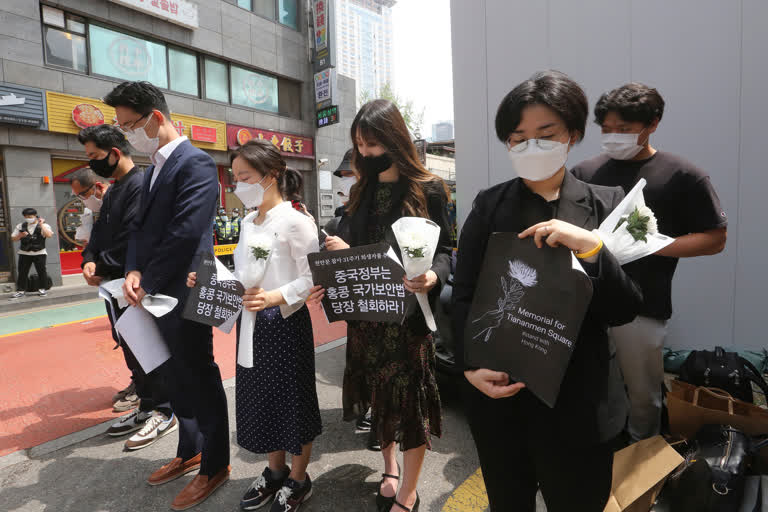Hong Kong: Thousands of people in Hong Kong defied a police ban on Thursday evening, breaking through barricades to hold a candlelight vigil on the 31st anniversary of China's crushing of a democracy movement centered on Beijing's Tiananmen Square.
With democracy all but snuffed out in mainland China, the focus has shifted increasingly to semi-autonomous Hong Kong, where authorities for the first time banned the annual vigil to remember victims of the 1989 crackdown.
Beijing is taking a tougher stance following months of anti-government protests last year, in what activists see as an accelerating erosion of the city's rights and liberties. Earlier on Thursday, the Hong Kong legislature passed a law making it a crime to disrespect China's national anthem after the pro-democracy lawmakers disrupted proceeding twice to try to prevent the vote.
Read also:World marks 30th anniversary of Tiananmen massacre
Despite the ban on the vigil, crowds poured into Victoria Park to light candles and observe a minute of silence at 8:09 pm (1209 GMT, 8:09 am EDT). Many chanted "Democracy now" and also "Stand for freedom, stand with Hong Kong".
While police played recordings warning people not to participate in the unauthorised gathering, they did little to stop people from entering the park. Authorities had cited the need for social distancing during the coronavirus outbreak in barricading the sprawling park, but activists saw that as a convenient excuse.
Read also:Tiananmen Square massacre turns 30
"We all know the Hong Kong government and the Chinese government really don't want to see the candle lights in Victoria Park," said Wu'er Kaixi, a former student leader who was No 2 on the government's most-wanted list following the Tiananmen Square crackdown.
Thousands of people were killed when tanks and troops moved in on the night of June 3-4, 1989, to break up weeks of student-led protests that had spread to other cities and were seen as a threat to Communist Party rule.
"The Chinese Communists want us all to forget about what happened 31 years ago," Wu'er told the AP in Taiwan, where he lives. "But it is the Chinese government themselves reminding the whole world that they are the same government ... doing the same in Hong Kong."
China did not intervene directly in last year's protests, despite speculation it might deploy troops, but backed the tough response of the Hong Kong police and government. It then announced last month at the annual meeting of its ceremonial legislature that it would impose national security laws on Hong Kong, circumventing the city's legislature and shocking many of its 7.5 million residents.
Beijing's Tiananmen Square, where thousands of students had gathered in 1989, was quiet and largely empty on Thursday. Police and armored vehicles stood guard on the vast space. Few pedestrians lined up at security checkpoints where they must show IDs to be allowed through as part of mass surveillance nationwide to prevent any commemoration of the event.
As has become customary, many dissidents were placed under house arrest and their communications with the outside world cut off, according to rights groups.
A Chinese foreign ministry's spokesperson offered the government's standard defence of the 1989 crackdown.
"The Chinese government has made a clear conclusion about the political disturbance that occurred in the late 1980s," Zhao Lijian said. "The great achievements that we have achieved ... have fully demonstrated that the development path China has chosen is completely correct, which conforms to China's national conditions and has won the sincere support of the country's people."
Despite the ban on the candlelight vigil, Hong Kong is bracing for possible "pop-up" protests of the type that raged around the city last year and often led to violent confrontations between police and demonstrators.
Thousands have been arrested in the demonstrations, which were sparked by proposed legislation that could have allowed suspects to be sent to mainland China for trial.
The Hong Kong Alliance in Support of Patriotic and Democratic Movements of China that organises the annual vigil called on people to light candles at 8 pm (1200 GMT) and planned to livestream the commemorations on its website.
AP
